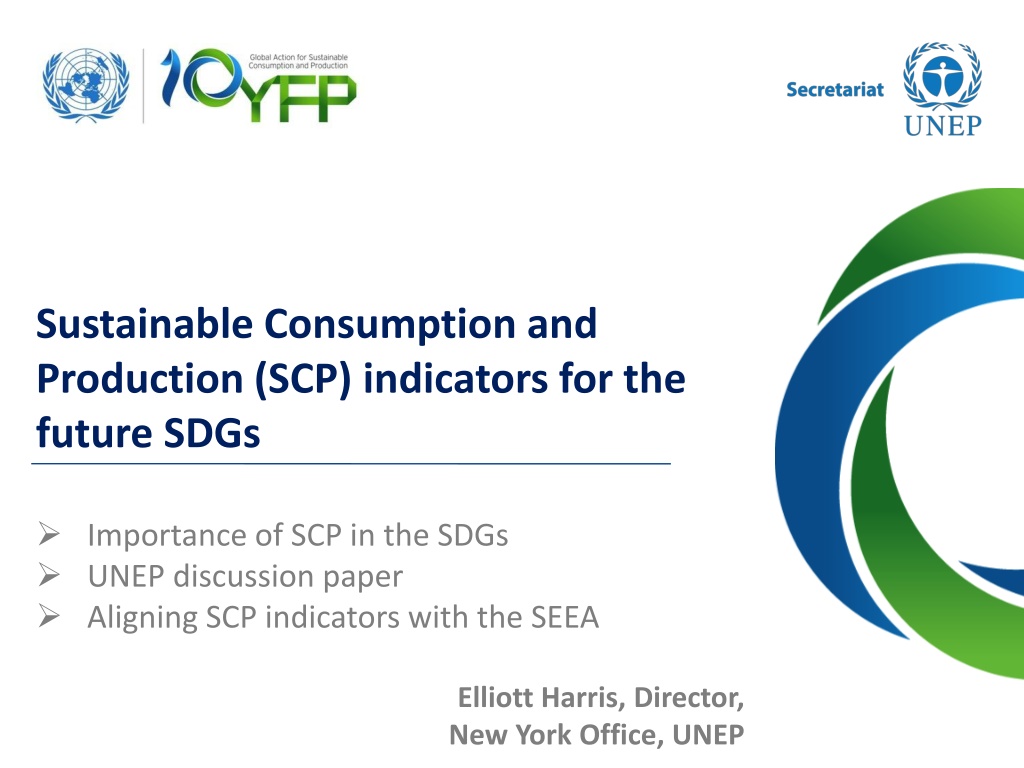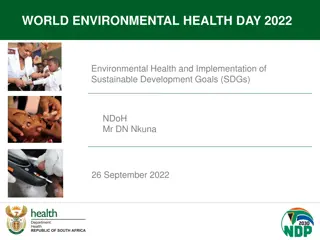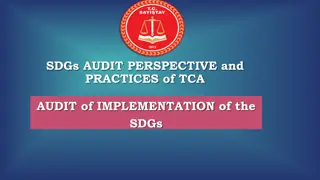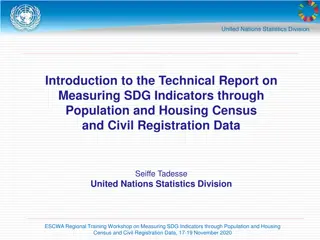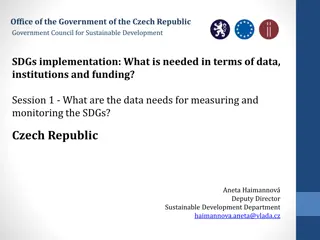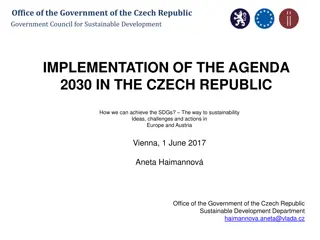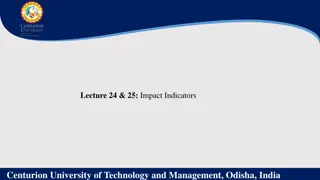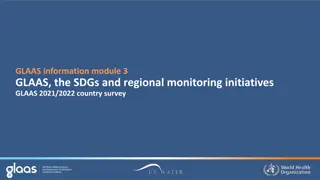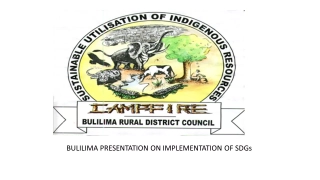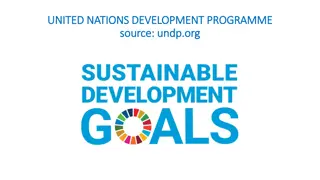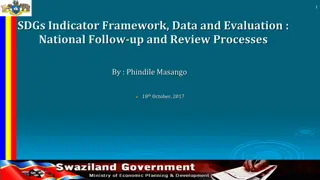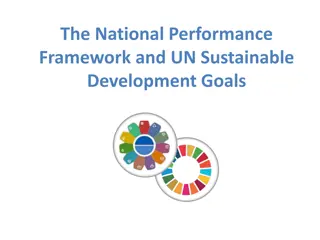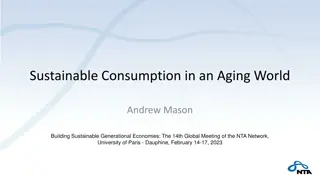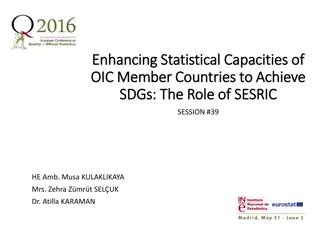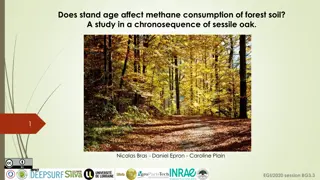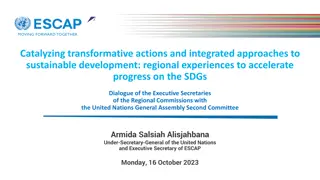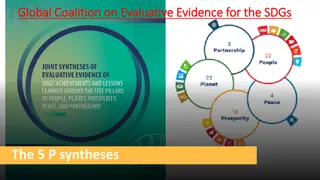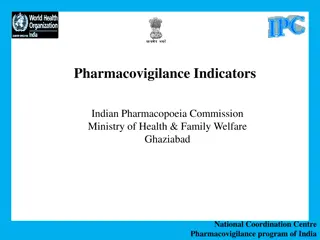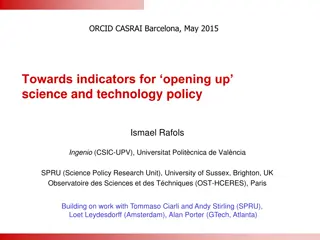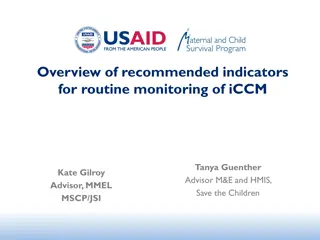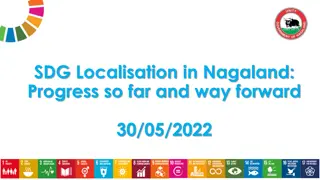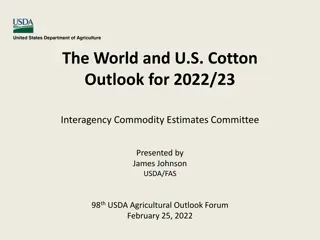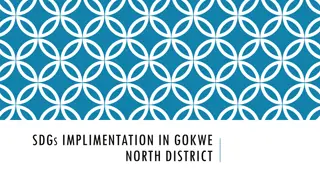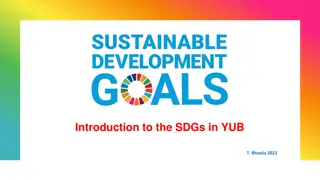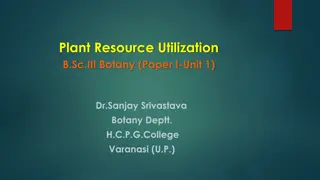Importance of Sustainable Consumption and Production (SCP) Indicators in Achieving the SDGs
Sustainable Consumption and Production (SCP) indicators play a crucial role in achieving the Sustainable Development Goals (SDGs) by monitoring resource use, pollution, and environmental impacts. The SCP indicators help in tracking progress towards SCP patterns and contribute significantly to the overall sustainability agenda.
Download Presentation

Please find below an Image/Link to download the presentation.
The content on the website is provided AS IS for your information and personal use only. It may not be sold, licensed, or shared on other websites without obtaining consent from the author. Download presentation by click this link. If you encounter any issues during the download, it is possible that the publisher has removed the file from their server.
E N D
Presentation Transcript
Sustainable Consumption and Production (SCP) indicators for the future SDGs Importance of SCP in the SDGs UNEP discussion paper Aligning SCP indicators with the SEEA Elliott Harris, Director, New York Office, UNEP
Why SCP indicators? Why SCP indicators? SCP importance in the SDGs SCP importance in the SDGs On 19 July 2014, the OWG adopted an outcome document of the SDGs by acclamation. Proposed goal 12 Ensure SCP patterns , includes targets on SCP, notably, target 12.1 : implement the 10YFP, all countries taking action, with developed countries taking the lead, taking into account the development and capabilities of developing countries . The 10YFP (Ten Year Framework of Programmes on Sustainable Consumption and Production Patterns) is a global capacity building mechanism for the shift to SCP. SCP is transformative, universal and central to the SDGs - reflected in at least 13 out of the 17 proposed goals.
New UNEP Publication New UNEP Publication Potential indicators for a sub-set of SCP- related targets in the proposed SDGs: set of indicators to monitor interface between economy, environment and society focusing on resource use, pollution and other environmental impacts from consumption and production activities affecting society + economy to translate goals and targets into tangible and measurable objectives
Methodology Methodology& & Objectives Objectives Proposed indicators are: integrated, science-based set to monitor progress towards SCP patterns and contribution to the achievement of the SDGs. each responding to more than one SDG target, making the SDGs more transformative by building inter-linkages between them screened through the following properties and objectives: Resource and critical thresholds/ carrying capacity Resource Decoupling Impact Decoupling Social Benefits Universality Linkages to other targets
Proposed headline indicators Proposed headline indicators Domain Indicators Related targets Scale of resource use Domestic Material Consumption (DMC) absolute and per-capita values Material footprint (MF) absolute and per-capita values National material efficiency material productivity (GDP per unit of material use). Production side: Material use measured through Domestic Material Consumption (DMC) Consumption side: material use measured through Material footprint (MF) Target 12.2 Decoupling economic activity from resource use and environmental impact Targets 8.4, 12.2 National energy efficiency Energy productivity (GDP per unit of energy use). Contaminants in air, water, and soil from industrial sources, agriculture, transport and wastewater and waste treatment plants. Targets 7.3, 8.4, 12.2 Impacts Targets 2.4, 3.9, 6.3, 12.4 Number of persons killed or injured by a natural and technological disaster and economic losses in USD. Targets 1.5, 3.9, 11.5, 12.4 Ocean health Ocean Health Index Targets 14.7, 12.b
SCP SCP and 10YFP relevance to the and 10YFP relevance to the SDGs SDGs References and relevant documents: Report of 10th OWG on SDGs: The 10YFP is the principal framework for international cooperation and will need to be adequately resourced . SCP Indicators for the Future SDGs, UNEP, March 2015 Towards integration at last? The sustainable development goals as a network of targets; DESA Working Paper 141, March 2015 The Global Meeting of the 10YFP (New York, May 2015) emphasized the universal and transformative nature of SCP, in the context of the proposed SDGs, and . .recognized that the 10YFP is a key implementation mechanism for the Post-2015 Development Agenda
Aligning SCP Indicators with the Aligning SCP Indicators with the SEEA SEEA SCP indicators should be consistent with the System of Environmental-Economic Accounting (SEEA) so that o the statistical underpinnings of SCP indicators are based on an integrated accounting approach o SCP indicators are in line with international standards of best practice to promote quality and comparability Alignment to be undertaken under the auspices of the UN Committee of Experts on Environmental-Economic Accounting (UNCEEA) and the Secretariat of the 10YFP To serve as an input to the work of the Inter-Agency and Expert Group on SDG indicators (IAEG SDG).
Aligning SCP Indicators with the Aligning SCP Indicators with the SEEA SEEA OBJECTIVES 1. Develop an implementation strategy for SCP indicators based on a systems approach: present in a language familiar to the SCP community the need for an information system which fits within the context of integratedstatistical systems in countries. 2. Highlight the need for capacity building on relevant policy applications of the SEEA as well as for data and indicator development required to guide the shift towards SCP patterns 3. Define suggested indicators according to the SEEA standard. in countries.
Thank you! Thank you! Contacts: unep.org/10yfp www.scpclearinghouse.org Secretariatemail: 10yfp@unep.org Follow us on @10YFP
